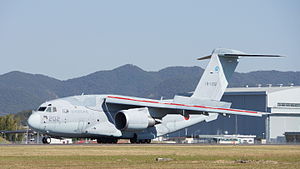Kawasaki C-2
| C-2 | |
|---|---|
 |
|
| The 2nd prototype C-2 in 2015 | |
| Role | Military transport aircraft |
| National origin | Japan |
| Manufacturer | Kawasaki Aerospace Company |
| First flight | 26 January 2010 |
| Introduction | March 2016 |
| Status | In service |
| Primary user | Japan Air Self-Defense Force |
| Number built | 5 (40+ planned to be built ) |
| Unit cost |
approx. 14 billion yen / 136 million US dollars
|
|
|
|
|
|
|
|
|
The Kawasaki C-2 (previously XC-2 and C-X) is a mid-size, twin-turbofan engine, long range, high speed military transport aircraft developed and manufactured by Kawasaki Aerospace Company. In March 2016, the C-2 formally entered service with the Japan Air Self-Defense Force (JASDF).
After researching foreign aircraft such as the C-130J Super Hercules, C-17 Globemaster III, and Airbus A400M, the Japanese Ministry of Defense concluded that there was no aircraft in production that possessed the capabilities that the JASDF required. In response to this need, the Japanese MOD commenced the production of plans to develop an indigenously designed and manufactured transport aircraft. In 1995, Kawasaki appealed to the Japanese Defense Agency (JDA) to issue funding for the development of a domestically-built C-X transport aircraft. In 2000, the JDA began forming its requirement for the replacement military airlifer; early determinations for the proposed project included that it would be powered by turbofan engines, possess the range to reach Hawaii from Japan, and carry double the payload of the C-130.
In May 2001, the MOD formally issued a request for proposals in regards to the new transport aircraft, referred to as the C-X program; at the time, the MOD planned to procure 40 aircraft to replace its aging Kawasaki C-1 and C-130 Hercules fleets. In December 2001, it was announced that Kawasaki Aerospace Company, the aerospace division of Kawasaki Heavy Industries, had been selected by the JDA as the prime contractor to develop the C-X.
...
Wikipedia
